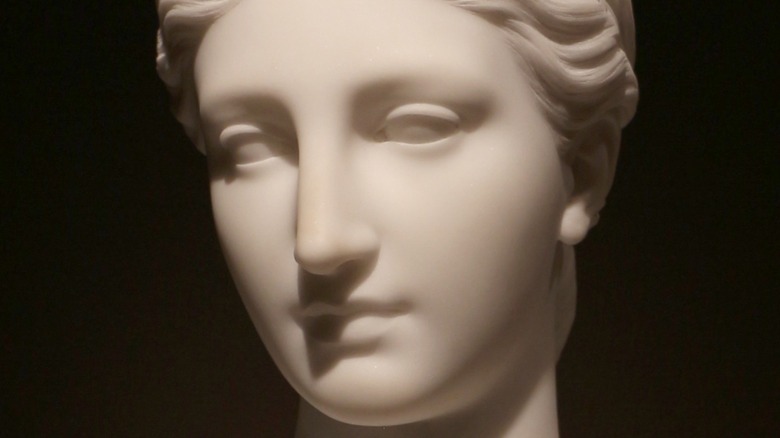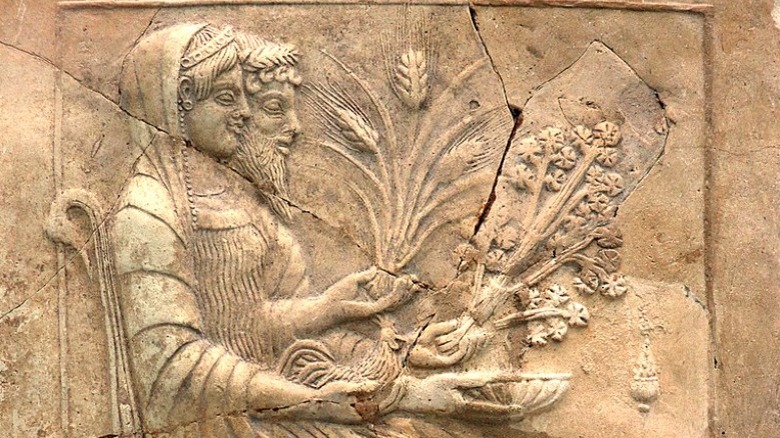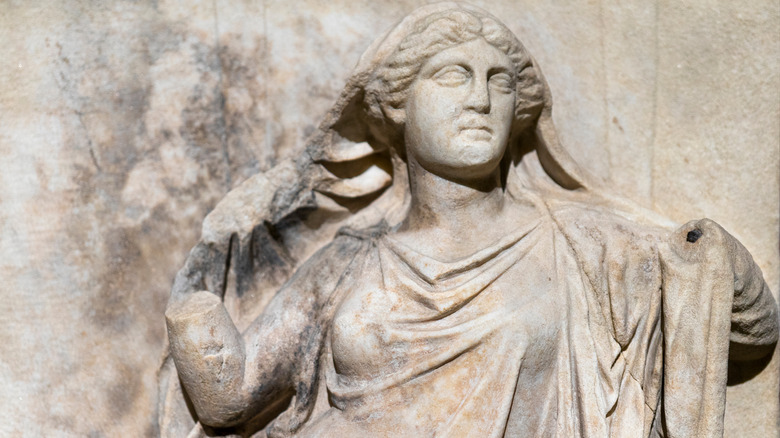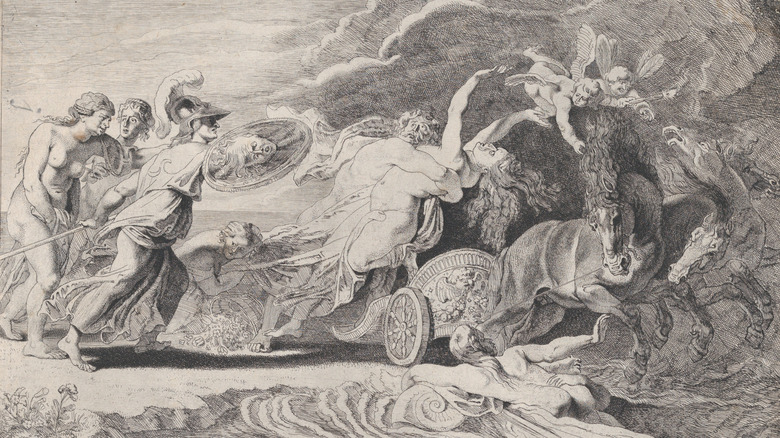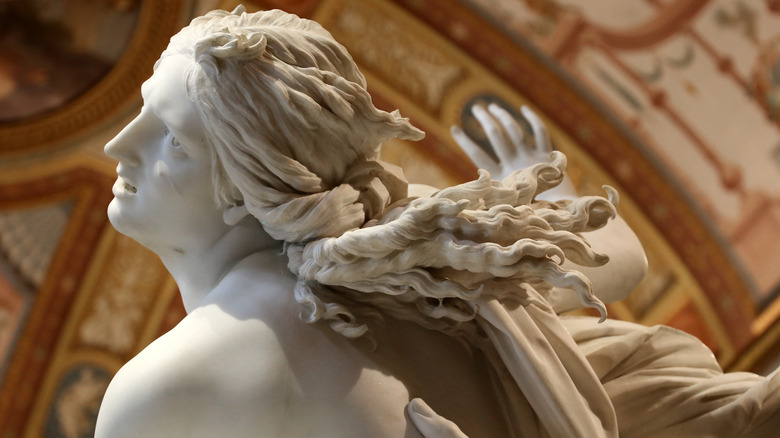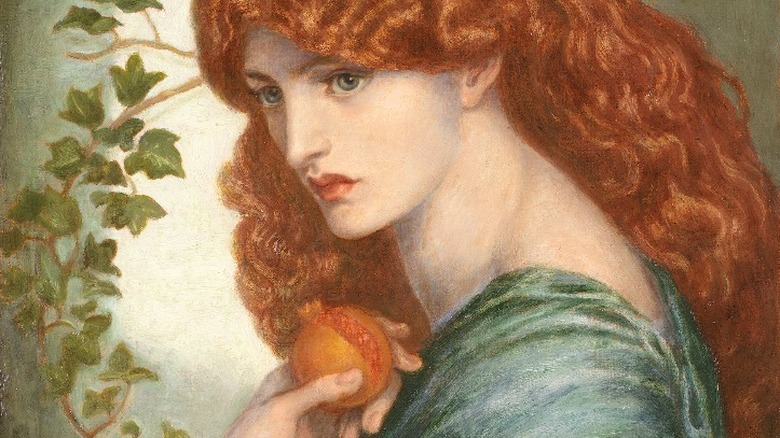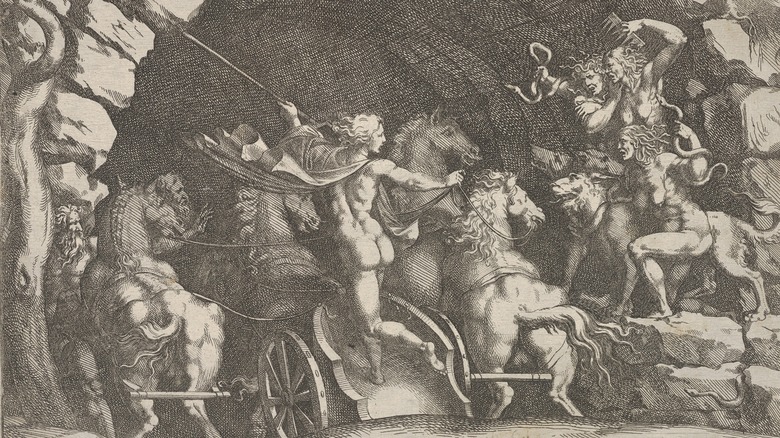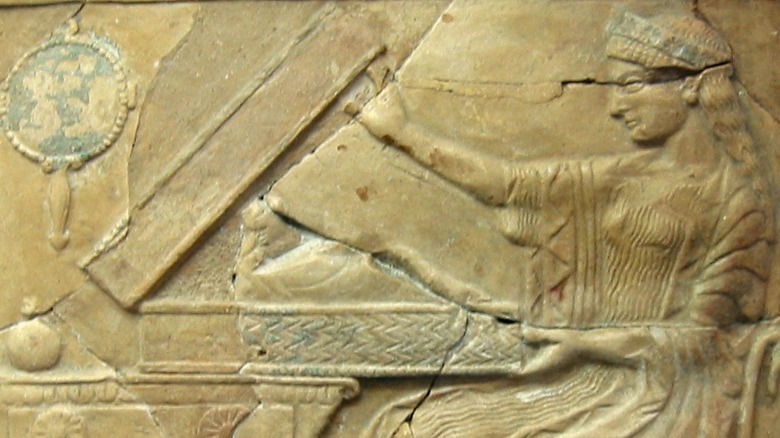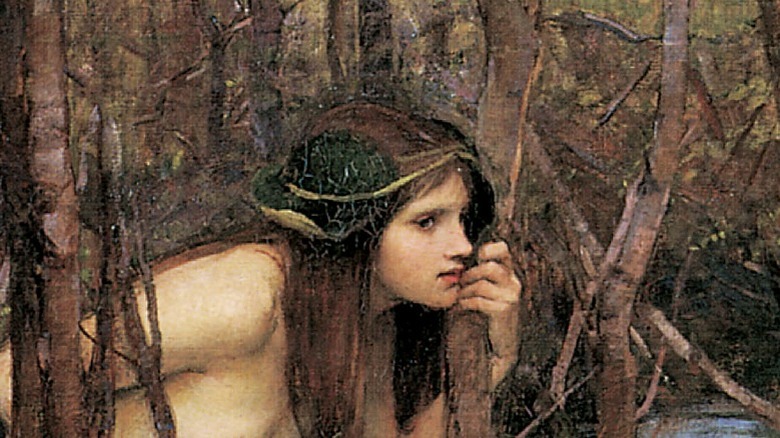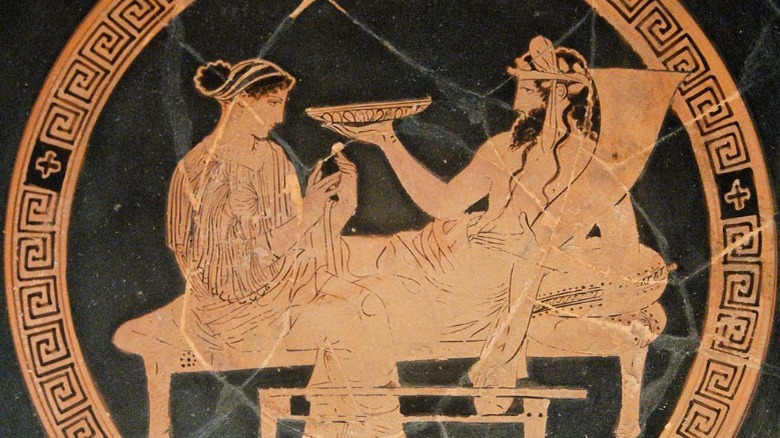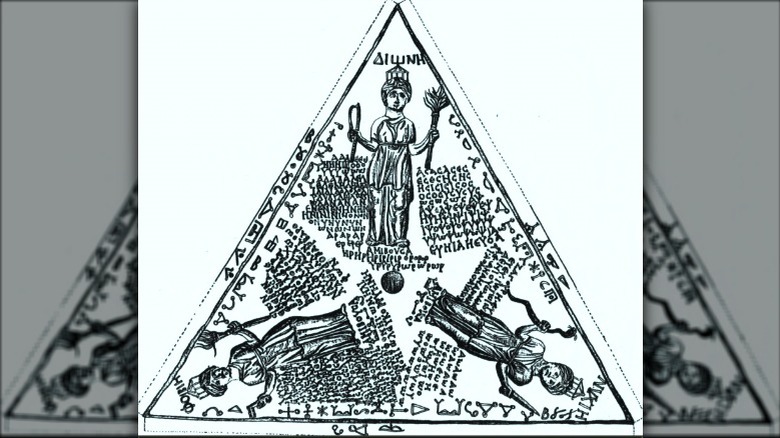Persephone: The Untold Truth Of The Queen Of The Underworld
The cast of characters in the Greek pantheon is truly expansive. Every god and demi-god, titan, and hero has their own agenda, and most of the time, those agendas clash, showcasing just how awful the gods are. There are endless tales highlighting all the various less-than-savory personalities in Greek mythology; especially Zeus, who manages to always be just the worst.
Persephone, on the other hand, may well be one of the few good eggs. Barring a couple of incidents where she arguably abuses her authority, she had a kindness to her, she nurtured both people and the earth, and even when she became queen of the Underworld, she still carried a sympathy to her that you might not expect to find in the Greek equivalent of hell.
Perhaps that's why modern interpretations are so kind to her too. In the musical "Hadestown," her character is immensely sympathetic and one of the most compelling characters on stage. And the graphic novel "Lore Olympus" details the early stages of her life and how she grew into the rare positive goddess that she was. But there is much more to the queen of the underworld. Here is the untold truth of Persephone.
Goddess of Grain
Every Greek god had their "thing." For Zeus it was a lightning bolt, Poseidon his trident, Hephaestus his forge, Dionysus his wine. It's become part of their identity in association with their individual powers. Zeus was the god of thunder, Poseidon of the sea, Hephaestus of fire, Dionysus of partying and wine. There was a god for literally everything, even beans. His name was Cyamites.
For Persephone, her thing was grain. According to World History Encyclopedia, she was more generally the goddess of all kinds of agriculture, but more specifically she was all about the grains. This was a role that she interchanged with her mother Demeter as well. They both oversaw the agricultural successes (or lack thereof) of their mortal subjects in Greece.
So even before she was kidnapped by Hades in one of the most infamous stories of Greek mythology, Persephone was a goddess with power and responsibility aboveground in the land of the living. Without her and her mother's influence, the Greeks would be left hungry, the crops would fail to grow, and the ground would turn cold and fallow. And those things would come to pass too, whenever Demeter or Persephone were feeling particularly spiteful towards poor mortals.
Motherly love
There just isn't a lot of familial goodness in the Greek pantheon. Shifting alliances and unnatural familial relations riddle the lot of them in such a way that it can often seem like every Greek god hates every other Greek god, because oftentimes, they do. For instance, according to the Oxford University Press, Athena and Poseidon had a fierce rivalry over control of the city of Athens. Another example from the Theoi Project is the Judgment of Paris, where a golden apple intended for "the fairest goddess of all" was bitterly fought over by Athena, Hera, and Aphrodite. And of course, this was all triggered by the goddess of discord, Eris.
Then there is Persephone and her mother Demeter, who had nary a squabble at all. They were so close that when Persephone was taken by Hades, Demeter exhausted herself trying to find her. And when she couldn't, she caused a drought, according to ThoughtCo, that would have caused widespread starvation across Greece. All for her dearly beloved daughter.
Not just that, but the very idea of them sharing responsibilities is unheard of among the Greek gods. Try to imagine Zeus sharing thunder-calling abilities with someone. Demeter and Persephone were so close that, according to The Conversation, they were often referred to as "The Two Goddesses."
Persephone was abducted with Zeus' permission
According to the World History Encyclopedia, Hades, god of the underworld, fell in love with Persephone while she was picking flowers. Rather than do the normal thing and speak to her, he abducted her on his chariot and took her off to the underworld, thoroughly enraging Demeter (Hades' sister and future mother-in-law) in the process.
But one aspect of the story that often gets overlooked — perhaps because it's not told in every version of the myth, according to the World History Encyclopedia — is that it was Zeus who facilitated the whole thing. According to both the Theoi Project and The Conversation, Hades came to Zeus for permission, and Zeus nudged his brother to go ahead and abduct Persephone. This is really what set mother Demeter off, given that Zeus was Persephone's father, as well as Demeter's brother and lover. Yeah. In response, Demeter denied the earth any agricultural growth until she got her daughter back.
So while Hades is rightfully frowned upon for taking Persephone in the first place, it was Zeus's actions that really caused a divide in the world of Olympus.
Her name change
Persephone wasn't really known as Persephone until after she was kidnapped. That name, after all, means "bringer of death," according to The Bump. In his poems, Homer referred to her as "dread Persephone" (via the Perseus Digital Library), which, like "bringer of death," wouldn't make for a good name for the goddess of growth, spring, and grains.
Before being kidnapped, she was more commonly known as Kore, which translates to "maiden," or "daughter," highlighting her innocence and purity. According to the Oxford Classical Dictionary, the difference is in where she was at any given time. As Demeter's daughter, she was Kore; as Hades' husband, she was Persephone.
This is another trait that is almost entirely unique to Persephone — while Greek gods often had a second name, like Athena beginning with "Pallas," those names came as a package deal. Persephone was not known as Kore Persephone or vice versa. There's a reason she has become more known as Persephone, and that's because she just did so much while she was the queen of the dead that it took over her reputation as a goddess.
Persephone's parents were siblings
While this should come as no surprise to anyone who has any familiarity with the Greek gods, Persephone's mother, Demeter, was the sister of her father, Zeus. The fact that her parents were brother and sister is an inevitability. After all, all of the gods are related, and all the major gods — the ones that have a high tendency for popping out little gods, are brothers and sisters — Zeus, Poseidon, Hera, Demeter, etc. Plus, if it's ever unclear who the dad is in a Greek myth, just assume it's Zeus, because that is more often than not correct. As is practically always the case with Zeus and his children, the consorting that led to the birth of Persephone was less than consensual, per Ancient Origins.
Needless to say, the abduction of Persephone by Demeter's non-lover/brother with assistance from her lover/brother put a strain on whatever complicated relationship Demeter hoped to retain with Zeus. To make things even dicier for the mother goddess, in her search for her daughter post-kidnapping, she was pursued by her third brother, Poseidon, who wanted to be more than just a brother (according to ThoughtCo). It's a mess.
And not to complicate matters even further, but Persephone never had any children with Hades. She, in fact, only ever had two children: They were both unsurprisingly by Zeus and, equally unsurprising, neither conception was consensual.
Pomegranate seeds
Hades kidnapping Persephone was one thing, but keeping her in the Underworld was another. After all, Demeter was on the case, and she was so determined to find her daughter that she blighted the entirety of Greece with a drought, threatening Zeus not to lift the drought until her daughter was found, per ThoughtCo. So if Hades was going to keep his dearly beloved wife with him, he was going to need to do something clever, and he did. He fed her pomegranate seeds. Now, the myths don't agree on how many — one, four, eight — but she ate them, and that bound her to the Underworld.
And this is where there's another disagreement as to why the seeds worked. According to the National Library of Medicine's exploration of the uses of pomegranate seeds, this all came about because "the pomegranate [is] a symbol of the indissolubility of marriage," and thus she was officially committed to Hades by eating one.
However, rather than keep Persephone forever and risk the eternal anger of Demeter, Hades agreed to let Persephone return to her mother for half the year, or for two-thirds of the year, depending on the version of the myth. LitHub takes it a step further with a version of the myth that shows that the pomegranates were so satisfying that even when Persephone isn't in the Underworld, she is ready to go back to eat more pomegranate seeds.
The reason for the season
Seeing as how Persephone was the goddess of spring, agriculture, grain, and most things involving good weather and all the lovely things that grow in it, it was tough for the earth to lose her, even for four to six months out of the year, as per the pact that Demeter and Hades agreed to. Those four to six months became known as winter. The time when the leaves fall, the flowers die, and nothing grows. After all, why would it, since Persephone isn't there and Demeter is still sour about that.
While versions of the myth differ over the time Persephone spent below ground, as seen in the two versions from the Hellenic Museum and ThoughtCo, the general idea is the same. Demeter only agreed to allow food to grow when her daughter was with her.
So next time you're bothered by the cold weather, just blame Demeter. Or actually, blame Zeus. Always blame Zeus.
Persephone took her job seriously
Despite her unceremonious rise to power, Persephone did a really great job as queen of the Underworld. She was a very sympathetic ruler and often took pity on the dead, many of whom were stranded in eternal damnation of some sort or another. For instance, perhaps the most famous of all is her dealing with Sisyphus. Condemned to push a rock uphill for the rest of eternity, he took his plight to Persephone. Sisyphus wished to see his wife again, to remind her to give him proper funerary rights, according to Oxford Classical Dictionary. Persephone agreed.
Similarly, when Theseus and Pirithous were caught trying to capture Persephone and take her away, Hades condemned them to the Underworld. But Persephone took pity and allowed Heracles to rescue them. Of course, she also allowed Eurydice to return to the land of the living with Orpheus so long as he didn't look back at her on the journey, and there we can see another of Persephone's traits. Sympathetic, sure, but she wasn't a pushover. She had stipulations to what she agreed to and in Orpheus' case, he looked back.
All these things she did next to Hades, showcasing just how much power she wielded in a land that was supposed to be controlled by her husband.
A strangely clean love triangle
Persephone was renowned for her beauty, according to World History Encyclopedia — something she did not leave behind when she came to the Underworld. There were numerous attempts to win her affection, including the failed kidnapping by Pirithous, who snuck into the Underworld to make her his wife. Even Theseus knew that was a bad idea.
Her most famous brush with an extramarital relationship came in the form of Adonis, a young man who was so handsome that his name is now a byword in the modern vernacular for "a handsome young man." The story goes, according to Britannica, that Adonis was so remarkable, even as an infant, that Aphrodite was stricken by his beauty. So much so that, odd as it sounds, she put baby Adonis in a box and gave him to Persephone for safekeeping. (Persephone is pictured opening the box.) When Aphrodite came back for Adonis, Persephone refused to give him up. They were both officially in love with him.
Zeus, in a rare level-headed moment, decided that Adonis would spend a third of the year with Persephone, a third of the year with Aphrodite, and a third of the year doing whatever he wished. However, according to World History Encyclopedia, Adonis was so enamored with Aphrodite that he spent that other third of the year with her.
Persephone turned her rival into a plant
Persephone is at the heart of quite a few Greek myths, from the freeing of Sisyphus, to the love triangle with Adonis, to the central part she played in the story of Orpheus. But she was also the key player in another story. And this time, the story involves her actual husband, the king of the Underworld.
The story goes, according to the Theoi Project, that there was a young naiad nymph (pictured) that had taken a liking to Hades. She was determined to win his affection and, according to some versions of the story, she was doing a good job of it. Naturally, Persephone was less than enthused about this nymph and decided to do something about it.
What she actually did differs depending on the myth, but the end result is the same. Some say Persephone turned the naiad to dust, and Hades made a plant grow from the dust. Some say that Persephone turned her into a plant herself. Either way, the naiad was now a plant. This naiad's name was Minthe, and the plant she turned into became known as the mint plant.
She may have loved Hades
This is a complicated question that doesn't have an easy answer. Both Hades and Persephone had a complicated history with love. Hades, unlike his brothers, was not out there impregnating everything that walked (and some things that didn't). He was actually very career-focused and definitely loved Persephone, according to the Collector. For Persephone, other than her foray with Adonis, she had very little else going on in the romance department. While it's obvious she wouldn't have loved Hades at the start, she may have grown into affection for him.
For instance, she did turn a woman eyeing her husband into a plant. Jealousy doesn't cleanly translate to love, but it has an implied crossover in the myth. As the Collector points out, "in many stories Hades treated Persephone like the queen she was, doting on her day and night and allowing her to flourish."
If not love, their relationship certainly feels like one of mutual respect. They both carried out their responsibilities in the Underworld without stepping on each other's toes, which is a testament in and of itself to their compatibility given how their family was handling things on earth and high above on Olympus.
Persephone had two children
Given how many children all of the Greek gods were popping out, it is more than a little disappointing that a strong, positive character like Persephone never had more, and none with her actual husband. In fact, her two children were both fathered by Zeus, who used his usual shenanigans to impregnate his daughter/niece twice.
Zeus disguised himself as a snake to trick his way into conceiving a child with his daughter the first time, and out popped Zagreus, Persephone's first kid. Classic Zeus. Aside from being the protagonist of the video game "Hades," Zagreus didn't have that long or notable a life. According to Britannica, Zeus intended on making Zagreus his heir, but Hera, Zeus's wife/sister didn't like that idea very much. She had the titans rip Zagreus to literal pieces. However, Athena saved the baby's heart and brought it to Zeus, who swallowed it and impregnated Semele, who had Dionysus, supposedly complete with Zagreus' heart.
Persephone's second child, Melinoe, was the goddess of ghosts. According to the Theoi Project, she "was a frightful, underworld goddess who presided over propitiations offered to the ghosts of the dead. At night she wandered the earth with her train of ghosts, striking fear into the hearts of men." (Pictured is a drawing of a tablet that invoked both Persephone and her daughter.) Not the worst turn-out for two kids, but if only there could have been more. Preferably not with Zeus.
